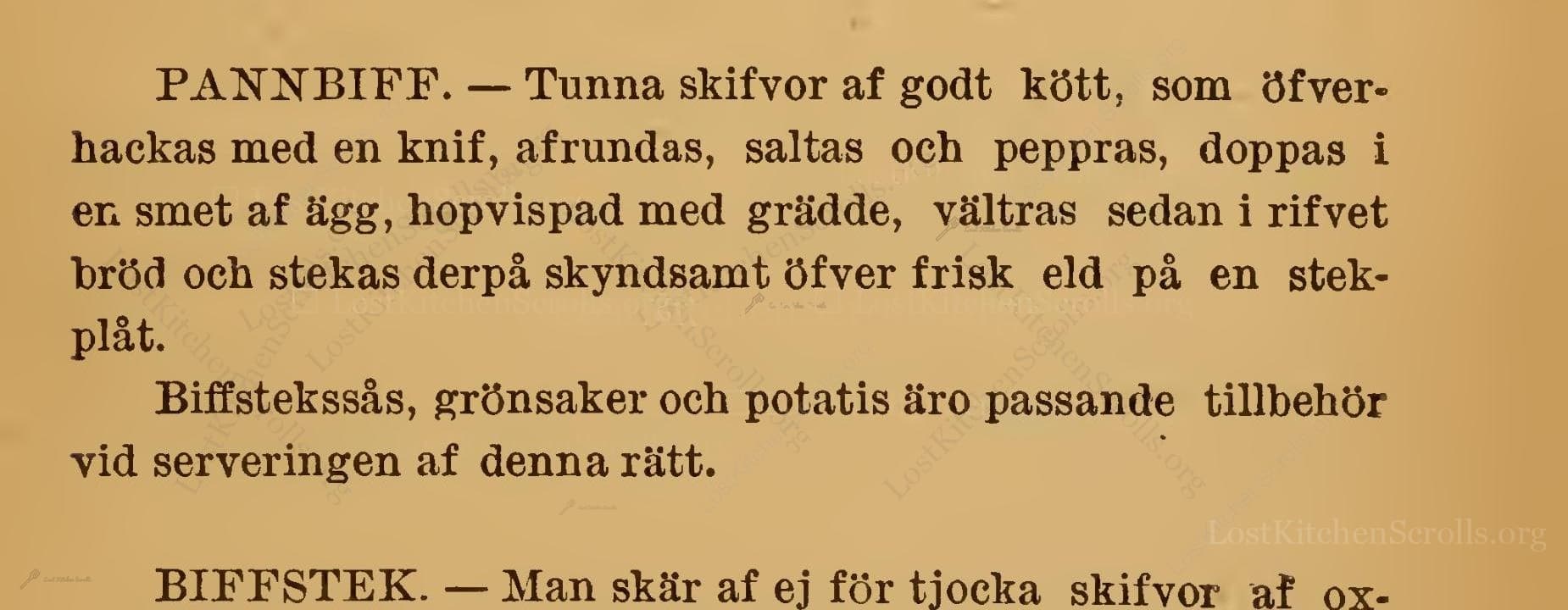Pannbiff
"Pannbiff"
From the treasured pages of Praktisk, illustrerad kok-bok för Svenskarne i Amerika
Written by C. A. (Charles A.) Vallentin

Pannbiff
"Tunna skifvor af godt kött, som öfverhackas med en knif, afrundas, saltas och peppras, doppas i en smet af ägg, hopvispad med grädde, vältras sedan i rifvet bröd och stekas derpå skyndsamt öfver frisk eld på en stekplåt. Biffstekssås, grönsaker och potatis äro passande tillbehör vid serveringen af denna rätt."
English Translation
"Thin slices of good meat, which are finely chopped with a knife, shaped, salted and peppered, dipped in a batter of egg whisked together with cream, then coated in grated bread crumbs and quickly fried over a lively fire on a frying plate. Steak sauce, vegetables, and potatoes are suitable accompaniments when serving this dish."
Note on the Original Text
The original recipe uses straightforward, succinct instructions, assuming the reader is well-versed in common kitchen practices of the time. Quantities and temperatures are left to the cook’s discretion, a sign of trust in practical experience rather than exact measurement. Terms like 'öfverhackas' (chopped over) and 'vältras' (rolled) reflect archaic spellings—modern Swedish would read 'överhackas' and 'vältras.' The focus is on efficient sequence and taste, with simple seasoning and common techniques, such as dipping in egg-cream batter and rolling in breadcrumbs for a crisp exterior. This pragmatic style dominates many 19th-century cookbooks, blending frugality, efficiency, and home comfort.

Title
Praktisk, illustrerad kok-bok för Svenskarne i Amerika (1889)
You can also click the book image above to peruse the original tome
Writer
C. A. (Charles A.) Vallentin
Era
1889
Publisher
Svenska bok-och musikhandelns förlag
Background
A practical and charmingly illustrated Swedish cookbook tailored for immigrants in America, this 1889 volume serves up a delightful array of recipes and culinary wisdom, blending Old World tradition with New World ingredients.
Kindly made available by
Library of Congress
This charming recipe for 'Pannbiff' comes from 'Praktisk, illustrerad kok-bok för Svenskarne i Amerika,' a Swedish-language cookbook published in Minneapolis in 1889—an era when many Swedes were settling in the Midwest of the United States. The book catered to immigrants longing for a taste of home, adapting Old World recipes to New World ingredients and kitchens. Pannbiff, a Swedish take on pan-fried beef patties, was hearty, adaptable, and could be served with familiar sides—potatoes and sauce—to create a comforting, everyday meal for hardworking immigrant families.

In the late 19th century, cooks would prepare this dish with a sturdy butcher’s knife for mincing the meat, a mixing bowl and whisk (or fork) for the egg and cream batter, and a wide, flat griddle or heavy iron frying pan (stekplåt) for cooking over an open flame or wood-burning stove. Dry breadcrumbs might be made by grating stale bread, and a large wooden spoon or spatula would be used for turning the patties. Plates were likely simple and functional, ready to present the meal hot from the pan.
Prep Time
15 mins
Cook Time
10 mins
Servings
4
We've done our best to adapt this historical recipe for modern kitchens, but some details may still need refinement. We warmly welcome feedback from fellow cooks and culinary historians — your insights support the entire community!
Ingredients
- 1 lb (16 oz) beef steak (sirloin or similar cut)
- 1 egg
- 2-3 tablespoons heavy cream
- 1 cup (2 oz) finely grated dry breadcrumbs
- Salt, to taste
- Black pepper, to taste
- 2 tablespoons (1 oz) butter (for frying)
- Boiled potatoes, to serve
- Seasonal vegetables, to serve
- Biffstekssås (steak sauce) or substitute with a basic gravy
Instructions
- Slice about 1 lb (16 oz) of good quality beef into thin sheets.
- Finely chop the meat with a sharp knife, then shape the chopped beef into small, rounded patties.
- Season each patty with salt and freshly ground black pepper.
- In a bowl, whisk together 1 egg with 2-3 tablespoons (2-3 tbsp) of heavy cream to create a batter.
- Dip each patty into the egg and cream mixture, coating them thoroughly.
- Next, roll the patties in about 1 cup (2 oz) of fine dry breadcrumbs until well covered.
- Heat a heavy skillet or griddle over medium-high heat, add a knob of butter (about 2 tablespoons/1 oz), and fry the patties quickly on both sides until golden brown and cooked through, about 2-3 minutes per side.
- Serve immediately with a classic pan sauce, boiled potatoes, and seasonal vegetables.
Estimated Calories
390 per serving
Cooking Estimates
You'll spend about 15 minutes preparing the ingredients and shaping the patties. Cooking the patties takes another 10 minutes. Each serving has about 390 calories, and this recipe makes 4 servings.
As noted above, we have made our best effort to translate and adapt this historical recipe for modern kitchens, taking into account ingredients nowadays, cooking techniques, measurements, and so on. However, historical recipes often contain assumptions that require interpretation.
We'd love for anyone to help improve these adaptations. Community contributions are highly welcome. If you have suggestions, corrections, or cooking tips based on your experience with this recipe, please share them below.
Join the Discussion
Rate This Recipe

Den Bockfisch In Einer Fleisch Suppen Zu Kochen
This recipe hails from a German manuscript cookbook compiled in 1696, a time whe...

Die Grieß Nudlen Zumachen
This recipe comes from a rather mysterious manuscript cookbook, penned anonymous...

Ein Boudain
This recipe comes from an anonymous German-language manuscript cookbook from 169...

Ein Gesaltzen Citroni
This recipe, dating from 1696, comes from an extensive anonymous German cookbook...
Browse our complete collection of time-honored recipes



